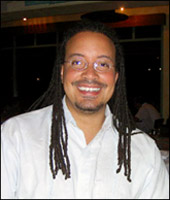Growing up in east Los Angeles as the son of Central American immigrants, the everyday challenges faced by the people in my community seemed far removed from the American dream: the lack of good housing and jobs, failing schools, scraping together money for groceries, and all-too-common police brutality.
If you had asked us, we would have told you we were concerned about the days when the air pollution was especially thick, or when the smells coming from the incinerator directly south of our housing complex were particularly bad.
We would have told you we were concerned — but that these were not the greatest challenges facing our community. Yes, they were important problems, but any political agenda that did not speak to the central economic and social needs of our community seemed irrelevant.
For communities like mine, environmentalism has seemed to be about preserving places most of us will never see. Even when environmentalism has focused on problems that affect urban communities, such as air pollution or lead poisoning, it has pointedly avoided addressing my community’s desperate need for economic development. Environmentalists do not talk about the importance of a living wage or affordable housing because, we are told, these are not environmental problems. Foundations feed this problem by failing to recognize minorities and urban city residents as prominent stakeholders in the environmental arena.
While many leaders of the environmental movement have a deep and abiding interest in social and economic equity, that concern is largely absent from their work because it is “not their job.” The same mistake is made by every other progressive movement, including the civil rights movement. We have become trapped in narrow categorical definitions of ourselves instead of developing a comprehensive understanding of what values we stand for.
After last November’s election, an essay called “The Death of Environmentalism” ignited a wide-ranging debate within the entire nonprofit community. The authors, Michael Shellenberger and Ted Nordhaus, accused the environmental movement of failing to offer a compelling vision for America. Instead, they said, environmentalists give “I Have a Nightmare” speeches and offer technical policy proposals that are far removed from the lives of ordinary Americans.
Consider this quote from the essay: “The environmental movement’s incuriosity about the interests of potential allies depends on it never challenging the most basic assumptions about what does and doesn’t get counted as ‘environmental.’ Because we define environmental problems so narrowly, environmental leaders come up with equally narrow solutions.”
I experienced these narrow definitions firsthand in the late 1990s, when my organization tried to pass legislation to make it easier to revitalize “brownfields” — the thousands of idle and polluted lots in inner cities.
Our legislation would have encouraged the development of brownfields by, first, clarifying clean-up standards so that developers would know what was required of them, and, second, limiting liability for current owners when environmental pollution had occurred under previous owners. It also would have also given cities and counties more power to go after owners of abandoned and potentially polluted inner-city sites.
Our legislation should have been an important priority for environmentalists because developing brownfields would take pressure off expanding construction to California’s rapidly dwindling green spaces. And yet the Sierra Club opposed the bill, claiming that the legislation’s flexibility would be abused by unscrupulous developers. We felt there were adequate safeguards, and that together, civil rights and environmental groups would be able to protect inner-city residents from new risks while accelerating economic development.
We eventually compromised on a watered-down version of the bill that was signed into law. But because the new standards remained so inflexible, we haven’t seen the kind of economic redevelopment of urban brownfields that low-income and mostly communities of color desperately need. Contaminated urban sites remain contaminated, economic development and affordable housing in the inner city hasn’t occurred, and California’s green spaces continue to be developed.
For too long progressives have created their identities according to the very specific problems they hope to solve. While I don’t consider myself an environmentalist, I do care about many of the things that environmentalists work to protect and preserve. I care more deeply, however, about creating good jobs and affordable housing for my community. This means that the environmental or post-environmental movement that will speak to my community must first and foremost promise economic development and better quality of life.
While there are many who feel sadness and anger that environmentalism is dead, I am optimistic that in dying, environmentalism might give birth to a new politics that offers a better future to both my community and the planet. Those environmentalists who are ready to relive will find many new allies like me ready to join them in building a new and more expansive movement on the other side.



